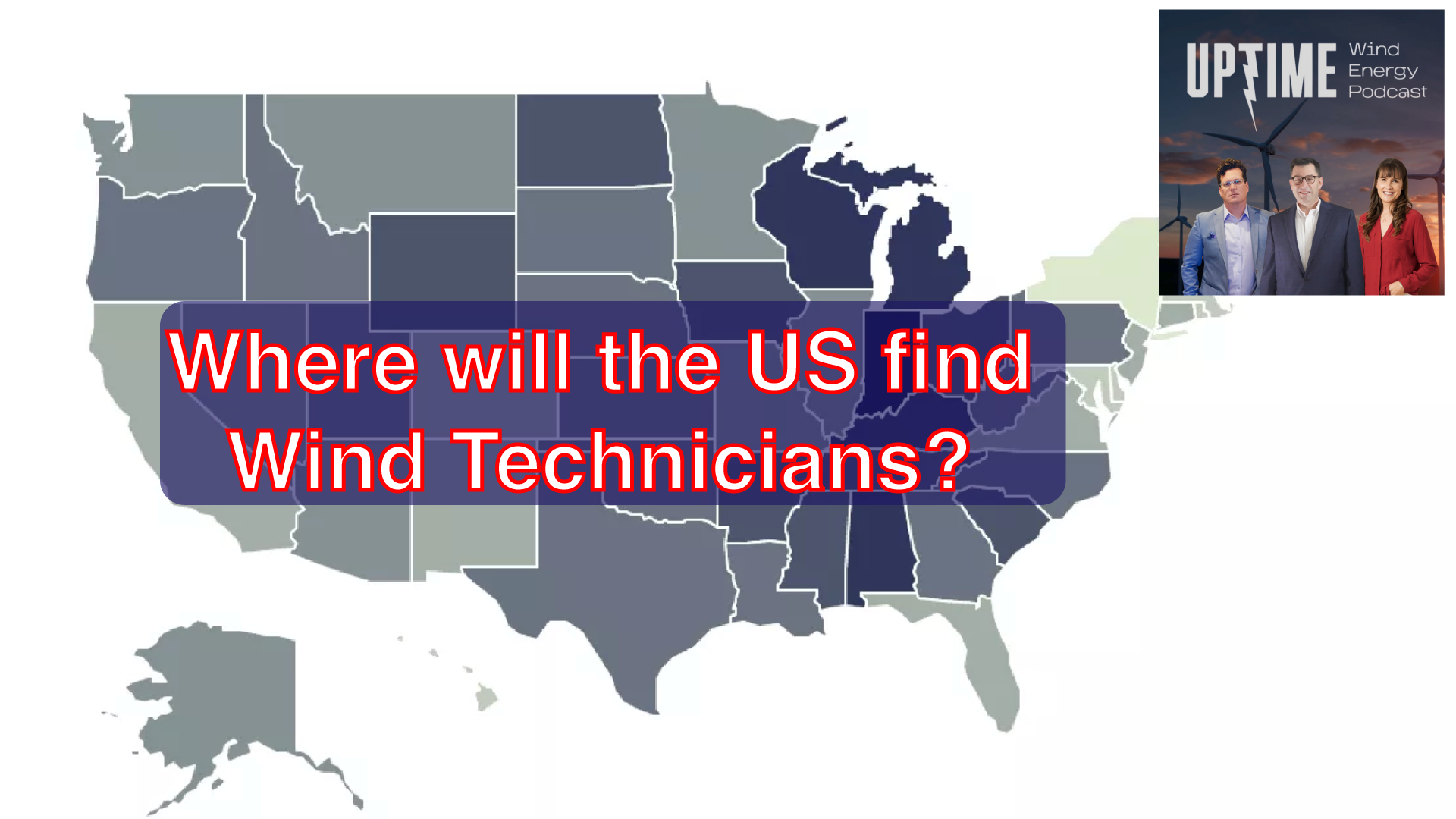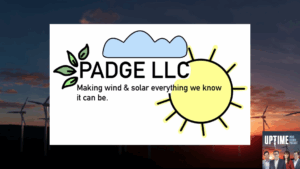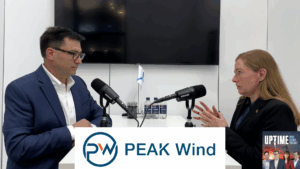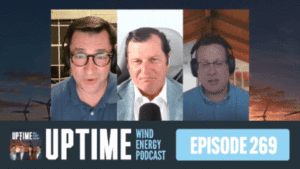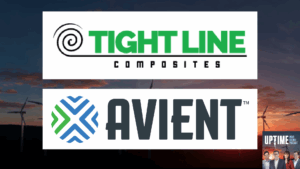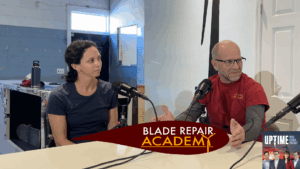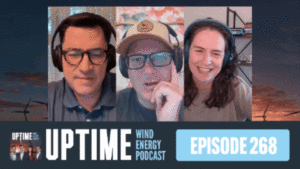Wind Turbine Technicians are in short supply. A recent report on the US states with mechanically-inclined workers provides insights into where to find future technicians. Joel, Rosemary and Allen discuss the report and the potential salaries for workers willing to move to the east and west coasts.
Visit Pardalote Consulting at https://www.pardaloteconsulting.com
Wind Power Lab – https://windpowerlab.com
Weather Guard Lightning Tech – www.weatherguardwind.com
Intelstor – https://www.intelstor.com
Podcast: Play in new window | Download
Sign up now for Uptime Tech News, our weekly email update on all things wind technology. This episode is sponsored by Weather Guard Lightning Tech. Learn more about Weather Guard’s StrikeTape Wind Turbine LPS retrofit. Follow the show on Facebook, YouTube, Twitter, Linkedin and visit Weather Guard on the web. And subscribe to Rosemary Barnes’ YouTube channel here. Have a question we can answer on the show? Email us!
EP 150 Bonus
Allen Hall: This is the Uptime Wind Energy Podcast bonus episode. In this episode, Joel Rosemary and I discuss where the mechanically inclined employees are in the United States, and they may be in places you haven’t thought of because some of them were surprised to me. So this is a good discussion because wind turine technicians are gonna become one of the primary expanding roles in America.
So it’ll be a great time to be a wind turbine technician. Question is where are they gonna come from? It looks like mostly in the middle of United States, but not all. So we have a, a good back and forth here. It’s stay tuned. This is a, an excellent episode, bonus episode of.
A, a really interesting article in construction coverage.com. Not a place that I frequent very often, but they had an article that just popped out called American Cities with the most mechanically Inclined Workers in 2023. Oh. . Maybe my little town’s in that. Curious, not like that, but, so let’s just, just curious to see.
Right. And they’ve sort of break down the mechanically inclined occupations from laborers and people who move freight stock around to people driving tractor trailers to general maintenance, repair people, construction carpenters, electricians, automobile mechanic. , kind of the general categories there.
But if you look at the growth where they say mechanically and client occupations in the energy sector have the highest growth projections, it is in wind turine service technician. There you go. So the two year and tenure growth, they are number one in that list. there. In the 10 year projections, it’s wind and wind turbines, number one, solar’s number two.
Wood pattern makers is number three. I, I guess that’s, that’s furniture makers probably. That makes sense. Derrick. Workers for oil and gas model makers. More oil and gas. Oil and gas. Oil and gas. So in terms of the growth, it’s gonna be wind, solar, oil, and gas. Is that, that’s not shocking, Joel, is it?
And I guess that would make
Joel Saxum: sense. No. , I would think that the oil and gas wouldn’t be, wouldn’t be growing as hard or as fast as the renewable side. But makes sense. You know, it makes me think back to Rosemary. You wouldn’t know this one cuz you’re, you’re not in the US but when you are 17, I think in high school they make you take a test called the asvab.
And the ASVAB is the military aptitude test. They
Rosemary Barnes: make you do a test to. If you would be good in the military or what you should do. They, they, yeah. They
Joel Saxum: like, they, they literally come, they came, they came to our school and were like, all right, all of the juniors into the auditorium and like 10, 10 guys and you know, two guys from the Marines, two guys from the Navy, two guys from the Army stood up there and they gave you this big speech about the military.
And then had you take this test. And the test, you don’t know it while you’re taking it, but how it scores you basically is, are you. What’s the easy way to say this? Are you, are you more inclined to be book smart or mechanically inclined? That’s what the test is like. Are, are you a guy that can go and like if there’s, if a truck is stuck in the woods, how do you get it out?
Or are you gonna solve a physics problem? , you know, and then there’s this, the, the physics
Rosemary Barnes: problem tie, allocate chalk.
Joel Saxum: Well, exactly right. Yeah, exactly. Exactly. There’s engineers that applied physics. There’s those, there’s a special people kind of in the middle that cross both those things. And those are the ones special shooting , right?
Yeah. So those are the ones that they’re going like, all right, here’s an offer for West Point. Here’s an offer for the Citadel. Here’s a offer for the Air Force Academy. That kind. So that, to be honest with you, the, the United States military d o d has the best set of data for this, but it, it makes absolute sense.
I mean, I mean, you know, I, I, I think on, even on, just, just remove the mechanically inclined part of it and just job growth in the us the number for through all the way through 2030 that the top two are wind turbine technicians and. And
Allen Hall: that’s, oh, I, yeah, that makes sense.
Joel Saxum: I’ll give you some personal experience from this side as well.
So I used to do a lot of oil and gas exploration. And in an oil and gas exploration, you are running survey equipment, but it’s not high order survey equipment. It’s pretty easy to run. It’s push, enter, scroll through here, push enter as you walk. Like, it’s pretty simple. But your jobs are, I mean, you might be on 300 square miles in Wyoming.
and you leave in the morning from the staging site on a UTV with a truck and some survey equipment, and you have a radio, but we’ll see you back in when it, when it gets dark. So those people are required to kind of be mechanically inclined and understand, like if you get a flat tire or if you’re, you know, a stick stabs through your radiator, like how are you getting back to staging, you know, if your radio goes down, like what are you gonna do?
So what I, what I found over the course of. I don’t know, eight years that I was responsible for those jobs is that the majority of the people that I hired from the Midwest, basically, and it was an expanded Midwest, we’ll even say from Montana to basically the upper part of Michigan and then down into, say, I would say Iowa, the northern part we’re the, we’re the best people that we.
where you could just trust them to, to go and get stuff done. You didn’t have to babysit ’em, you didn’t have to worry about them. If there was an issue, they’d figure it out. If they, if a tool was broken, they’d figure out another tool or they’d, they were resourceful. They could get things done. When I had some, a couple of, and I, and I don’t wanna appoint any fingers, right, but I had some, some people from the farthest west coast and the farthest East coast, and they.
Man, it was like you, you had to train ’em to do every single thing out there multiple times. And then the other, the other side of it was people from the, the far south where it was warm all year round and they had a pretty good life. Most of their lives. If they had to go do something hard, they didn’t wanna do that either.
Allen Hall: Okay. So let, let me give you the breakdown here by state. So let. , Rosemary, you’ve been to America a couple of times. You got a pretty good sense of this. You were in California for a long enough period of time. Mechanically in kind workers relative to the rest of America, California,
Rosemary Barnes: I’m gonna say, I’m gonna say less.
Less mechanically inclined. My, my my outside probably very stereotypical ex expectation would be the further towards the center, you get the more mechanically minded cuz you know, big, big city. Latte zippers aren’t necessarily known for their mechanical aptitude. I would say stereotypically speaking,
Yeah. Am I right?
Allen Hall: They’re changing transmissions in the street. Probably not though, right? Yeah. All right. So the, the, as the list goes, I’ll run down, and Joel, I think you pretty much hit it right on the head. Indiana has the most the highest share of mechanically inclined workers. Now, do you know, can you guess.
Joel Saxum: I know one of the markets there, so or two of ’em farming. And they make every r they, they manufacture every RV in North America. Yes,
Allen Hall: they do. And a lot of transmissions are made there. So a lot of auto automotive components are made because Indianapolis 500 s right there. And so if you go from like Indianapolis up into sort of Michigan area, there’s just a ton of automobile component factories in that manufacturing that space.
So they really know their stuff. That’s, I went, went to school in Indiana at Rolls Hol. , a lot of those, the, my fellow students were from Indiana and man, they knew how to make stuff. Mm-hmm. , it was shocking. I’m from Nebraska, we know how to make some things right. , they were, they were surprisingly well versed in machine shop world.
So lemme give you, let me give you the. Small and mid-size metro areas for the most mechanically inclined workers because you, that’s where a lot of the mechanical inclined people are. They’re not in, they’re not in New York City. They’re not in, they’re rural America necessarily. They’re rural America.
Rural, yeah. Yeah. So I think these places kind of make sense. Elkhart, Goshen, Indiana, Shaboygan, Wisconsin, Midland, Texas, Oshkosh, Wisconsin, Spartanburg, South Carolina. I, that one I didn’t expect, but that’s a surprise. Good rock. Yeah. Rockford, Illinois. Decatur. Alabama. Alabama’s in that mix. Right. Morristown, Tennessee, Chambersburg, pa, which I, I’ve actually been in Wassa, Wisconsin.
Appleton. Wisconsin. Albany. So Lebanon, Oregon, all those. Right. So you,
Joel Saxum: you can think about where that is. All those towns. Yeah. All those towns in Wisconsin are literally within an hour of each. Right. So Rock, Rockford, Illinois, Shaboygan, wasa, Appleton, let’s, those are all Green Bay Packer fans, baby. That’s hardworking.
You’ve got, you’ve got, you’ve got Harley, Harley Davidson factories there, Harley, you’ve got Mercury Marine. There’s a ton of, ton of manufacturing and industry there. Well, going
Allen Hall: to mid-size metro areas. Yeah. And mid-size metro areas. The, the, it changes a little bit about where it is cause the city’s a.
York, pa, which is a big industrial area if you haven’t. Mm-hmm. driven through there. Stockton, California. Which odd? Yeah. Morgantown, North Carolina, Lancaster, pa, which I would agree with. Fort Wayne, Indiana. Again. Indiana. Toledo, Ohio. Makes sense. Lot of manufacturing there. Lakeland, Florida. Reno, Nevada.
Did anybody know what Reno? What’s in Reno? Nevada? Casinos. Casinos, that’s what I was gonna say. And there’s, yeah, there’s a Tesla battery factor out there. There’s, there’s a Tesla
Joel Saxum: battery factory. It’s a lot of lead and silver mining, right? Lead
Allen Hall: silver. Copper. Yeah. Yeah. There is, there’s a ton of mining out there still.
Redding, pa Greensboro, North Carolina. So Huntsville, Alabama. So if you start going through the list, like, oh yeah that all makes sense now. All those places that we just named are sort of a wind country at the moment that that’s where the ones in the southeast technician would come from. The southeast
Joel Saxum: ones are a little bit odd to me, but the manufacturing is there, so that makes sense.
Right.
Allen Hall: So if wind termist technicians are gonna become the new hot mechanical job, And it makes sense if you’re in an Iowa, Indiana where there’s a lot of wind turbines, man, they, they’re just loaded with the ability to grab technicians right there. Mm-hmm. . What happens when we get to these offshore wind and we start putting a lot of wind TURs in California, putting ’em in, in New York state Massachusetts, where the mechanically inclined aren’t necessarily there.
Yeah. You think you’re gonna, you are gonna hire a kid from Indiana to move to Massachusetts. That’s not super likely. You
Joel Saxum: know, deer, there’s no, there’s no big deer to deer hunt out there. .
Allen Hall: Well, you know, they have restrictions on a lot of things that a person in Indiana would not necess necessarily agree with.
Okay.
Joel Saxum: Yeah. Right. Yeah. That, that, that’s the issue. Right. That’s, we talked about that last week or the, a couple weeks ago, about the, the American Workforce Fairness Act or whatever it was about trying to get these things like the, the, the people just aren’t there, the skillset, isn. , they, you know, another odd one on that list, and I want to go back to the offshore thing, but I, I don’t wanna forget this one is Midland, Texas.
So I’ve talked to quite a few people out there through, I, I used to be working in Midland quite a bit and oil in gas world. And a trouble in Midland is everybody that’s born and raised in Midland and, and is excited to actually live in Midland, wants to work in oil and gas because the wages are so much cheap.
Sure. Yeah. You can be a, you can be a rig, you can be a rig hand and make 150,000. I
Rosemary Barnes: was gonna say that they if they want to attract off offshore win technicians to the big cities, then they’re gonna wanna be paying them better than the ones that are living rural. I know last time I updated my G W O training and it was the first time I did it in Australia.
There were a couple of. Young, young kids there apprentice, electricians and other trades, and they had entered the wind industry as a way to escape big city prices. So like in we’ve got a bit of a, a cost of living crisis in Australia, especially in the big cities, and. This guy was saying, you know, he he can’t afford to live in Sydney with the money that he makes as a, you know, second year apprentice electrician.
So he moved to, to Muji. He said it’s great so I can, you know, I can live on, on my own. It’s wine country, so tour wineries on the weekends, , and yeah, working in the wind farms is just great. So it will be interesting to see how. Yeah. The offshore wind farms can, can lure people back from those kinds of nice lifestyle changes that you can make as a wind turbine technician.
Yeah. The difference there
Joel Saxum: will be that, or that’s the difference that they’ll have to pay them. That that’s the only way you’re gonna get people to, to do that. Right. To come from Center America is you’re gonna have to, yeah, you’re gonna have to shoot their wages to the moon to get, to move to the coasts because, I mean, as it boils down politically, a lot of people in the Midwest will just say like, I’m not moving there.
Like, I’m not going, I’m not going to that liberal, strong holder, whatever. Like that’s kind of what it is, right? I mean, it’s just a reality in the us
Allen Hall: right? Even Joel, I think you, you hit it on the head. Even in rural New York, which tends to be more mechanically inclined than sort of New York City area.
They don’t wanna go to the coast in general. They’re not, they’re not going, yeah. They have not a lot of love for the New York City area. . In terms of politics and
Rosemary Barnes: lifestyle, there’s still mechanical people in those cities, right? I mean, there’s gotta be. Yeah. Or people with, with trades. I mean, wind tur, wind turine conditions come from a lot, a lot of backgrounds like, you know, yeah.
Electricians or machinists or, you know, whatever. And surely LA and New York have, have those trades there that could be persuaded over to yeah, to the wind. Do I
Allen Hall: think that’s gonna be the issue, Rosemary, is that people who are say, are mechanically inclined and say they’re working in HVAC or they’re working in automotive repair, it probably makes some, some decent money in those areas.
Do I want to retrain to do this thing out on, out in the cold Pacific Ocean I, Atlantic Ocean? I don’t think so. I probably probably don’t want to do that. And so that’s where they’re gonna have trouble because there’s just not enough. And that’s real, the real issue. And if I, I want to give you the top.
Big city places. And Joel, I, I stop me when you, you hear one the goes like, oh, that doesn’t even make any sense. But I think they, I think they mostly do. Number 10, coming at number 10. Houston,
Joel Saxum: that one doesn that sense
Allen Hall: makes sense to me too. Milwaukee, number nine, Milwaukee. That should be higher on the list.
I, I, I thought so too actually when I saw it. Number eight, Cincinnati. And that, that’s also including the kind of the Kentucky, Ohio, Indiana corner right there. Lot of industry there. Right. Tulsa. . I love Tulsa. Tulsa. That place is, is awesome to me. It’s decent weather. They’ve got aerospace, they have oil and gas, they have a lot of different technology things there, Tulsa.
And so there’s a lot of mechanically client people there. Some of my family lives there and they’re definitely mechanically, my family’s mechanically inclined. That’s a, they just got attract it to their Indianapolis. Indianapolis, 500. , right. All auto, auto, automotive things around there. Memphis, Tennessee, that’s one I didn’t expect Memphis.
Joel Saxum: I don’t expect that one either. That’s an odd one. Yeah,
Allen Hall: right. I I wouldn’t expect that. Detroit. Yep. Working in car factories. Right? No. Number four. Number three is Louisville, Kentucky.
Joel Saxum: There’s a lot of car factories in manufacturing down there too, though. True
Allen Hall: Fords there. Yeah. Fords
Joel Saxum: in Louisville. Yeah.
There’s a Chevy. There’s a Chevy plant there too. They make Corvette. .
Allen Hall: Oh, that’s right. That’s where they had the big sinkhole at. The Corvette Museum was in That was near there. . You remember that, Joel? Were they the sinkhole at the Corvette Museum? I remember that. I didn’t know it was in Kentucky though. I think it was in Kentucky.
Yeah, I think it’s right near the factory. All right, number two. Okay, this is where I think we’re gonna go sideways. Riverside California.
Joel Saxum: Riverside, California. Okay. So where is Riverside Is? Riverside is Riverside’s radio side of LA isn’t it? . Isn’t Riverside
Rosemary Barnes: outside? I think so. It’s east of la. I can confirm.
I have a map here. Cause I don’t know about half of these places.
Joel Saxum: then that makes, I mean I, if they’re going by volume, it makes
Allen Hall: sense. Oh, maybe it’s a volume thing. Okay. Yeah. Okay. Maybe it’s a volume thing. And then number one I a drum roll. Grand Rapids, Michigan. Yep. Grand Rapids, Michigan. that Yeah, that would make sense to me too, cuz of the cars.
Joel Saxum: Yeah. It’s, it’s, it’s, it’s all, it’s all unionized labor for the veh past
Allen Hall: vehicle industry generations. Yeah. Generations of mechanically inclined people because it’s been passed down . Yeah. Through kids doing the same job. The, the parents were doing pretty much
Joel Saxum: the Riverside California one is, is interesting, but it makes sense because it’s, there’s something has to feed that metropolis.
Right. When, when you talk about, well, the other ones, oh, that’s, Oh, almost all the other ones are feeding metropolis, like Houston, fourth largest city in the country. Makes sense. If you talk about the third largest city or Chicago, so Indianapolis, Milwaukee makes sense. Fort Wayne, they’re all right there within an hour and a half drive.
So R Riverside makes sense cuz it’s feeding la and they’re actually, I know some, I know some, some pretty good engineers from out there too.
Allen Hall: But that doesn’t mean there’s, doesn’t mean there’s nobody, you know. Yeah, yeah, yeah. It’s just. Yeah. So let’s, let’s look at where the wind farms are gonna be offshore.
Boston, right? A lot of wind TURs near there. Mm-hmm. 54th on the list. 54th. That’s a struggle. Yeah, that’s gonna be hard. And new, New York, New Jersey. Newark area is 55th, right? So they’re, Boston and New York are basically in the same spot versus where all these offshore wind turbines are gonna be. I can’t, it’s gotta be really hard to find technicians in that area because, It’s just, it’s a lot of finance.
There’s a lot of investment groups, there’s a lot of teachers and schools, just not a lot of mechanics, I think you
Joel Saxum: could see. Okay, so let’s go back to the, what is an offshore windfarm technician’s day look like? They’re going SOVs. So if they’re SOVs, a lot of times it’s too on, too off, right? Yeah. So I think that you’ll see you, you’ll see quite a few like maritimers from Maine coming down like, Hey, I gotta go do my hitch.
Boom, come down for two weeks, go offshore. Go back to. because they actually do have some maritime people there, and they’re a little bit more, it’s very rural up there, a little bit more mechanically inclined in my mind. And they’re used to the water. Some fishermen from up there are fishermen families and stuff.
I, I can see that happening in the Boston area and in Massachusetts, vineyard, wind and whatnot. Sure. . So that makes sense to me. But the ones on the southern coast, everybody I know every, well, I guess my, this is my stereotypical opinion of people from North and South Carolina as they’re hanging out on the beach.
They’re not out, they’re not out working on vessels offshore . So I don’t know where those ones are gonna come from. .
Allen Hall: Well, that’s, I think that’s where the trouble is if we know that we’re having a hard time right now, and I, I think the word on the street is they’re having a hard time finding people. This is.
if they have to. America’s 330 million people compared to Australia is what, 17 million? Something like that. Mm-hmm. . So we have a huge population base, but pulling them from the Midwest out to the east or west coast is gonna be dang near impossible. So what do you
Joel Saxum: do? You, you develop in the Gulf.
Allen Hall: Oh, okay.
Because that’s where I was going. The golf, I think that’s, The
Joel Saxum: Gulf Coast, the Louisiana is full of offshore workers. That corner of Texas is full of offshore workers. The, they’re already there. They know, they know their way around vessels. They’ve, they’re working on offshore platforms already. That, that one, I think the other, here’s your other one.
Develop offshore wind in the Great Lakes. There’s a ton of workers up there.
Allen Hall: They’ve been prohibiting that. I mean, I think it was Lake Erie where they put a stop to it. And I think a lot in the Great Lakes area, they’re gonna have a lot of trouble with putting wind turmans out there. They will. Offshore wind’s gonna be in trouble, I think, for technicians.
Mm-hmm. , I think looking at these stats here, it indicates future trouble. Midwest, Iowa, Nebraska, Kansas, Oklahoma, Texas. There’s a
Joel Saxum: shortage, but it’ll come. So I think there’s a generational thing here too, right? Where if you start talking about, . Okay, so I, I graduated high school in 2005 and there was not a talk, it was in the Midwest.
There was not a talk about a wind turbine whatsoever. And back then, there was so few and far between that it wasn’t a thing. Now, if I was, if you’re growing up in high school in the Midwest, you’re s no matter what you’ve, where you’ve been, you’ve seen some. So it’s a topic of conversation, it’s something at the forefront.
Now. There’s more programs being talk, talking about them and whatnot. So the more we can educate the young people as they come up and more of these little two year, the two year technician degree programs pop up. I think that in the Midwest you’ll see, cuz that’s a high paying job in the Midwest, in the rural communities, there’s not a lot of high paying jobs, you know?
Right.
Allen Hall: So let me, let me throw this number at you. I have no technicians that are making six figures in the. . Right. So they’re making a hundred thousand dollars a year. They’re working their tails off to do it, but they’re They’re doing it. They’re doing it, yeah. What would you have to pay at someone like that to go out to Vineyard, wind, or to any of these projects off the coast?
what, what would it take? Is it $150,000? Are
Joel Saxum: you making, are you making a move there or are you flying ’em back and forth? They have to,
Allen Hall: I, I, oh man. They can do whatever they please, but I, I think it all has to level itself out in a pay scheme of some sort. Right. If, if they want to travel back and forth, they can do that on their own.
Yeah. If Buddy, what kind of Sally range are we talking about?
Joel Saxum: If talking about almost 200 grand? Yeah. If he’s making six figures working wind farms in the Midwest, hanging out with his family and his buddies having beers after work to get him to move to the east to west coast, it’s gonna be, well, it’s gonna be, yeah.
200 grand. Well, you, you can factor in right away. Like say you’re in, say you’re a guy from working on a wind farm in Minnesota and you go to California, you lose 4% of your income. by state tax difference. Yeah, because it’s like 6% Minnesota and 10% in California. Right. So boom, there you go.
Allen Hall: Which is why you go to Texas, right?
Yeah. To be a technician Texas resident. Absolutely. Yeah. There you go. So Rosemary, how much money would it take for you to start climate towers again? 200 grand. Which is that? Is that where the number is? I, that’s a good salary. Right? I think you’d have to get to that number though. Almost close to it.
Yeah, sure.
Rosemary Barnes: I, I mean, I really love climbing towers, but it’s interesting to me the first climb of a trip. . It’s like, this is the best. My job is so great. I can’t believe get paid to do this second day. You’re a little bit tired, you’re a bit sick of, you know, there’s no toilet up there. And it’s kind of, you know, it can be tedious.
You, you’re like, okay, you’re set to calm down at the end of the day, and then you go to restart the turbine and there’s a fault. And you have to, you have to stay there until you solve, solve that. And then, yeah, third, fourth, fifth day, you’re kind of like, okay, I’m exhausted. My harness is so heavy, I’m cold.
And yeah, the food out here sucks. No time to exercise, but you’re exhausted anyway. And yeah, so I, I think , I always, because I haven’t climbed a, a turbine in a. In, in over a year now. I have my rose colored glasses on about it. I’m like, you wouldn’t have to pay me that much. I’ll, you know, someone call me, please.
I, I miss climbing turbines and I, I wanna do it again. But to be a full-time wind turbine technician climbing every day, yeah, you would probably have to pay me quite a lot for me to stick with that. More than . More than a couple of months, I think. At least you’re still
Allen Hall: alive, . Well, we’re gonna find out.
I think the, the, the data is fascinating. Yeah. And the more information we get as we go along here it, unless this starts changing pretty soon, you’re gonna see some really high salaries for technic. Which is gonna raise the price of energy, but yeah, I’m okay with that. Yeah, so we,
Rosemary Barnes: we see that in Australia every time there’s a mining boom that inflates salaries for all, all kinds of trades.
And also it kind of affects all kinds of engineering, which is nice for , for all engineers, but it is ridiculous for their people working in the mining industry. And there’s a lot of fly and fly out in Australia because the places are so remote. Often no one, no one even lives in the you know, close to the mines where they’ve got to go.
But yeah, it’s definitely. . When you see a jobs boom like that, you do start pulling people with any kind of aptitude or any kind of remotely relevant previous work experience, you’ll train them. I mean, it’s not, it’s not such a brand new, totally different job being a wind turbine technician to being, you know, any other kind of mechanical electrician.
You know, something like that and companies will, will train people. So I don’t think it’s going to be purely just a grab for the people with experience. As a wind turbine technician. It’s gonna be partly about that because you need to train people and you need people that have, you know, seen, seen things before and you continue that knowledge.
So I think experience when turbine technicians probably there will. The, the good ones. There will be some you know, competition to get them into new wind farms, but I think the majority of the jobs is gonna come from taking either new, new apprentices, fresh outta school, or people that yeah, have a trade already and, and wanna make a change and are happy to live in the area.
That would be my
Allen Hall: guess. Well, Joel, what, what are gonna be the specific skillsets that’s gonna drive this? I, I’m thinking composite repair, if you have that skillset. That’s gonna kind of put you to the top of the ladder. I
Joel Saxum: think your composite repair is gonna be a an existing supply chain driven thing.
If you are a composite repair person, I got a hard time thinking that you’re gonna be the ones going offshore if you’re new to the industry. And that’s just from, from my side thinking there’s, that that skills can be imported cuz I’ve seen it, we’ve done it. Okay. And I, but the, it’s the, the day-to-day guys, I think that.
we need to, that’ll be the skills, right? So it’ll be the, the oil changes, the, the regular guys checking meters, cleaning stuff up inspections, up tower, that kind of stuff. I think those are the, the more the service oriented rather than the specialty people will be okay. Will be the ones they’re looking for.
And it’s the, it’s the same thing, like when an, when an oil boom happens, there’s, there’s drillers and they grab drillers from all over the world to go, like when, so, so the oil boom in North Dakota, , 2006 to 2010 on, then on Western North Dakota. A lot of those drillers came from Texas and, and Oklahoma and even some from overseas in, in in the Middle East and stuff.
Because if we need the drillers, those are the guys that are trained, well, they know what they’re doing, we’ll pay ’em a premium. They come up here. But the service people that are driving around, checking roads, looking at gauges and running tools and that kind of stuff, those are the, those are the ones that are easier to pick up off the street where they’re.
we’ll have a hiring festival at this school and, and you can get hired on the spot. Yeah. You know, in 2007, I always, this one always sticks in my head, but in 2007, and I don’t know if, if you’re, if you’re in the US you’re known North Dakota. . But if you’re in you know, in a global audience, you may not know where Williston North Dakota is, what is in the western corner of North Dakota, in the middle of nowhere surrounded by farm fields and nothing else, but now pumpjacks and, and natural gas wellheads.
But in 2007 there was a little car dealership in that town that sold the most amount of Corvette’s in all of North. And it was because all of these tech, all these, I mean, I was, I was just fresh outta high school when this was happening. And I knew people going out there, 19, 20 years old, living, living in their cars, parking in Walmart, parking lots, making a hundred, 120 grand a year at 18 years old.
Yeah. That didn’t, they couldn’t tie their
Allen Hall: shoes. Yeah. Texas is full of when we were in Texas last time I think with you Joel at a conference, I noticed how many RVs there were of mechanic. And they were living in their RVs. They had traveled from some other state and they were just living in their RVs, working jobs.
Yep. That’s what was happening was I was shocked. And the number of RV sales in Texas was astounding. Yep. Astounding. And poho trailers and pickup trucks. The sales on those were incredible. And I’ve been in Kansas and the Midwest where pickup sales are pretty good. They’re nothing like Texas. In those mechanics, they
Joel Saxum: were.
You see the Texas, the Texas truck is. It’s a like a one ton truck with a, with the dual rear wheels with a big Miller or, you know, welding miller welding machine on the back of it with a bumper pole camper. And he’s, boom, he’s heading out and he’s got, he’s got 10,000 bucks worth of rims and tires on his truck and a fancy paint job and everything on it.
And, and he’s chasing pipelines. He or she .
Allen Hall: That’s a lifestyle. Rosemary ,
Rosemary Barnes: I’ve done a bit of vanlife chasing pipelines. Not, not for that reason, but in Europe. We had a, a transporter that we built a, a, a bed and some storage in the back and, oh, one of my favorite, favorite holidays that we had was three weeks driving around Norway.
We, we had. Four bikes, probably four surfboards, rock climbing equipment hiking stuff as well in and us packed into this transporter and drove around and, and it rained every day. , , trying to, to dry your, your wetsuit when you’re, when you’re doing van life. And it’s raining. No, not that easy. And I don’t recommend
Joel Saxum: These guys are. These guys are traveling with welding rods, chewing tobacco, monster energy drinks, and Bud and Bud Light . America. Yep. Right there. Yeah.



